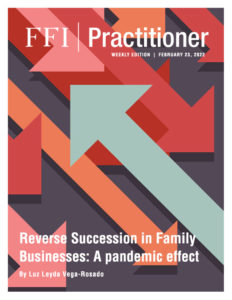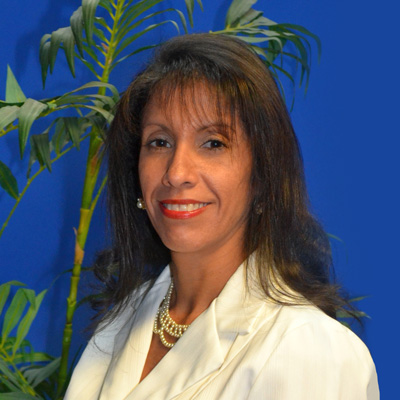
View this edition in our enhanced digital edition format with supporting visual insight and information.
Thank you to this week’s contributor, Luz Leyda Vega-Rosado, for her article exploring a phenomenon she refers to as, “reverse succession.” In reverse succession, members of the older generation have rejoined the family business to help navigate the business through the challenges caused by the pandemic—after the transition of leadership to the next generation has already occurred.
The COVID-19 pandemic has caused many challenges for the business world, including supply chain problems, high production costs, and labor shortage. However, an additional challenge has been faced by small and medium family businesses around the world; a phenomenon I refer to as “reverse succession.”
Succession, by definition, is a dynamic process in which the roles and tasks of the predecessor and successor change over time, intersecting and overlapping (Araya-Leandro, 2012) until the next generation ultimately assumes leadership of the family business and the older generation transitions out of day-to-day leadership of the company. For example, Gimeno et al. (2010) describe the different types of family business models and how they evolve, as well as different types of successors. However, the pandemic has challenged the way in which advisors and researchers approach the topic of succession in family businesses.
Since 2020, several of the family firms I work with, have described to me how the pandemic has impacted their planned succession process. In fact, several of these firms had senior generation members who had already retired before the pandemic or were in the process of retiring. However, during the pandemic, they reentered the business because the next generation business leaders now needed their help to keep the firm afloat. This is the phenomenon I refer to as “reverse succession.” It is an unplanned process that begins when an unexpected event threatens the family business after the transition to the next generation has already taken place.
Reverse succession does not occur because the next generation is not capable of running the family business. During the pandemic, it has happened, in large part, because many small and medium-sized family businesses have lost key employees and members of the older generations reentered the work force to help fill those leadership voids in the family business.
In many cases, the next generation family members have remained in the highest leadership positions in the firm, often making important decisions that this challenging time has required. The energy of the next generation can be beneficial to combat the challenges that this virus has imposed on companies and organizations. The older generations who, in some cases, are still stockholders and who have returned to managerial positions of equal or lesser complexity than before, are complemented by the knowledge and expertise that the rising generations have acquired. Moreover, in the families I’ve worked with, the next generation is the one that is up to date with the recent regulations and programs imposed by governments on businesses to help stop the contagion. They are also up to date with the technology that has become almost mandatory for businesses to survive this crisis. In the process of reverse succession, next generation family members have assumed the day-to-day operational leadership responsibilities of the company and are now the bosses of the older generation who have reentered the business during the pandemic. However, at the same time, members of the older generation have retained their important role as leaders helping to drive the strategic decision-making for the family enterprise during and after the pandemic.
Many founders and parents who developed succession plans before the pandemic taught their children how to navigate the family business through expected challenges but may not have adequately prepared them to lead the business through unprecedented, international disasters. Now, their successors are learning to manage a family firm during a global pandemic through a high-stakes practice of trial and error. This circumstance was unimaginable to many members of their predecessors’ generation. With this new, hard-won experience, the next generation is retraining the senior generation that have reentered the business to fill the spaces left by employees and family members who, voluntarily or involuntarily, left the business during the pandemic.
Family business advisors can take reverse succession into consideration in the following ways:
- Promote open communication between generations that includes not only business topics, but family and human issues that provoke stress during (and in the future, after) the COVID-19 pandemic.
- Respect the expertise of the next generation members who are leading the family enterprise in an unprecedented and very difficult time.
- Be sensitive and appreciative towards the members of the senior generation who have returned to provide strategic and operational support at this critical moment. The use of adult learning methodologies to retrain them is recommended.
- Recommend that the succession process for post-pandemic generations include a strong component of crisis management skills, as well as stewardship development for the family legacy during difficult times.
Now more than ever, intergenerational solidarity (Gimenez-Jimenez et al., 2020) has been necessary in family enterprise, and it will likely remain crucial for the future generations in the post-pandemic world.
References
Araya-Leandro, A. (2012). El proceso de sucesión en la empresa familiar y su impacto en la organización. Tec Empresarial, 6 (2), p. 29-39.
Gimeno, A., Baulenas, G., Coma-Cros, J. (2010). Family business models. UK: Palgrave Macmillan.
Gimenez-Jimenez, D., Edelman, L.F., Minola, T., Calabró, A., Cassia, L. (2020). An Intergeneration Solidarity Perspective on Succession Intentions in Family Firms. Entrepreneurship Theory and Practice, 00 (0), p. 1–28.
About the Contributor

Luz Leyda Vega-Rosado, FFI Fellow, has a PhD in business administration with specialization in international commerce. For more than a decade, she has been a researcher and advocate for family enterprise. She is the author of Family Businesses in Puerto Rico: Challenges, successful practices, and recommendations. She can be reached at [email protected].

View this edition in our enhanced digital edition format with supporting visual insight and information.





